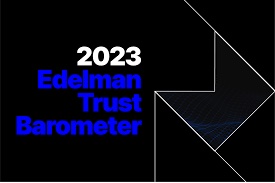This is Blog No 11
This is the week when Heads of state, government ministers and global business leaders convene in Davos, Switzerland for the World Economic Forum.

It was recently described as "the gathering that everyone loves to hate … a whole bunch of the global elite, so to speak, trekking up to a fancy Swiss ski resort and then talking platitudinously about the important themes to save the world."
But the themes themselves are rather important and include climate change, the cost of living, energy security, food and water supply, technology downsides etc. Many of these emerge in one way or another in the subjects upon which we consult rather extensively and more locally – in the UK as well as other countries.
So this week, I have been looking in detail at the authoritative Edelman Trust Barometer, whose Global Report is fascinating. It surveys citizens in 28 Countries and one of its main findings is that in most countries there is greater trust in business than in either the media or in government. In some countries the gap is alarming.
It’s pretty bad in the UK. Trust in Government stands at 37% (cf 56% in France and 47% in Germany). 50% profess to have trust in business. That UK figure has worsened 5% points since last year – a reflection no doubt of the political shenanigans at Westminster, and will surprise no-one. More detailed study shows that one of the key drivers of this is that Government agencies are seen as purveyors of misleading or inaccurate information.
The implications of mistrusted government are too obvious and too serious for a democracy, and need no further elaboration here. But how to address the issue? Whose job is it? Here I am clear that there is no one big-bang solution; certainly the election of a different political party will not make much difference on its own.
However, all of us who play a role in engaging the public do have a potentially important part to play. We know that the public is sceptical about what is stated in consultation papers. This is often wrong and unfair. But that is the perception. They believe that Councils, NHS bodies, Government departments and regulators cherry-pick the facts they present in order to make a case for change. On too many occasions, statistical slights of hand have come to light only at judicial reviews, often closing a stable door only after important policy horses have bolted.
It is a bit onerous to ask Directors of Communications and Stakeholder engagement specialists to rein in the enthusiasm of policy people. They naturally want to promote their preferred options and ‘sell’ their solutions to a public which is hardly expert and can be influenced by clever messaging. But, as in all fields, there are ‘tricks of the trade’ some of which we discuss in The Politics of Consultation. There are ways of working with colleagues and preserving our integrity.
But we need more. In the same book, Elizabeth Gammell and I made the case for an Office of Public engagement – an independent body, not unlike the Office of Budget Responsibility. Somewhere to set new and better standards and enforce them, making it more difficult for Ministers and civil servants to ride roughshod over best practice principles. See Regulation pages).
As we approach a General Election in 2024, will any of the political parties have the vision to promise such a radical step? Will they match inevitable talk about ‘restoring trust’ with an imaginative proposal like this?
Watch this space. We are working on it!
See Rhion's Speeches, Talks and Presentations.
For More like this - free of charge: SUBSCRIBE now
Leave a Comment
I hope you enjoyed this post. If you would like to, please leave a comment below.